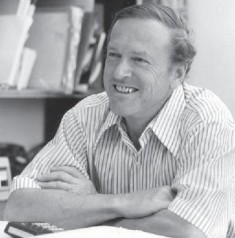Thomas Gold was a cosmologist, an astrophysicist, and one of the three scientists who proposed the “steady state” theory of the universe. He also served as professor emeritus of astronomy at Cornell University. As an astronomer and physicist, Thomas Gold has grown famous over the years for his variety of bold theories that defy conventional wisdom. His work was not just limited to astronomy, but Thomas also contributed in varied fields including biophysics, geophysics, and aerospace engineering.
Early Years
Thomas Gold was born in Vienna, Austria, on May 22, 1920, to a wealthy Jewish family. His father, Max Gold, was an industrialist who owned one of Austria’s largest mining and metal fabrication companies. His mother, Josephine Martin, was a German actress.
In the 1920s, the family moved to Berlin, where Max Gold had taken a job as director of a metal trading company. By 1933, when Adolf Hitler came to power, Max Gold sent Thomas to a boarding school in Switzerland and moved to England along with Josephine Gold.
Thomas Gold did his early studies at a boarding school in Zuos, Switzerland. He was intelligent, clever, and good in sports. In 1939, Thomas entered Trinity College at Cambridge and began studying mechanical sciences. In 1940, Thomas Gold was sent into internment in Canada, where he spent 15 months in a camp. He re-entered Cambridge University and graduated with a pass degree.
Career Beginnings and Highlights
After graduating in 1942, Thomas Gold worked as an agricultural laborer in England. After this, he joined Bondi and Hoyle on Naval research. The three men used to have scientific discussions on topics such as astrophysics, cosmology, and mathematics. Soon Gold was given the responsibility of developing new radar systems.
After WWII was over, Gold stayed with the Naval research until 1947. After that, he began working with Cambridge’s Cavendish Lab and worked on the development of the world’s largest magnetron, which was a device that generated microwaves, to be used for radar detection. He also worked along with zoologist RJ Pumphrey at Cambridge to study the impact of resonance on human ear. Through his work, Gold hypothesized that ear works by regeneration, suggesting that cochlea worked under feedback mechanism. Later on, his hypothesis was discovered to be correct.
Discussing Various Theories
Gold, Bondi, and Hoyle were always discussing problems and gaps in physics and various theories. They thought there were issues with Hubble’s Law and redshift. The three also started to question the Big Bang theory, which was originally suggested by Georges Lemaitre, which suggested that universe started to expand from extremely dense state and continues to do so even today.
In 1948, Gold along with Bondi and Hoyle published papers on solid state theory, which presented an alternate to the Big Bang theory. However, by the 1960s, major problems started to emerge with the solid state theory, as revealed by certain discoveries. While Bondi accepted that there were flaws in the theory, Gold and Hoyle continued to back their theory for quite some time. Later on in his life, Thomas Gold expressed certain doubts about the theory but maintained that it helped in understanding the origin of the universe.
Professional Career
In 1952, Gold left Cambridge to work as Royal Greenwich Observatory in England as Chief Assistant to Astronomer Spencer Jones. Gold returned to America in 1956, after the retirement of Spencer Jones, to work as professor of Astronomy at Harvard University.
In 1959, he accepted an offer from Cornell University to take charge of the Department of Astronomy and to set up an interdisciplinary unit for space research and radiophysics. In 1968, Gold proposed that pulsars were quickly rotating neutron stars, which were emitting electromagnetic radiation at short and consistent intervals. His theory was not well received initially, but later on it was accepted widely. This led to advancements in astronomy and solid-state physics and paved way for Stephan Hawking’s path breaking research on black holes.
Later Years and Death
During his career, Gold also served as a consultant to NASA and held important positions on several space committees. However, his equation with NASA turned sour after he became a vocal critic of their space shuttle program. Throughout his career, Gold continued to attract controversies. However, he never stopped challenging the status quo or what did not seem right to him.
On June 22, he died in Ithaca, New York, following a long battle with heart disease. He was 84 years of age.
